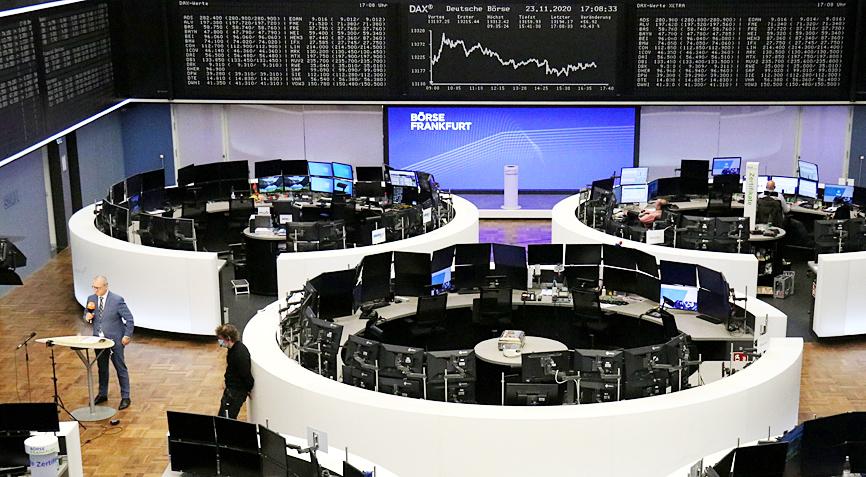The Frankfurt stock exchange’s blue-chip share price index, the DAX, plans to add 10 companies to better match its international peers, market operator Deutsche Boerse AG said yesterday.
The change, aimed at bringing the index into “line with international standards,” would take place in September next year, it said.
The DAX comprises Germany’s largest companies, but one of its most high-profile firms, the fintech Wirecard AG, collapsed in a massive fraud scandal earlier this year.

Photo: Reuters
Wirecard admitted in June that 1.9 billion euros (US$2.26 billion) missing from its accounts did not exist at all, sparking a storm of criticism over how the company had been able to operate without regulators noticing problems.
Deutsche Boerse said that inclusion in the new index would require companies, among other things, to show that they have made an operating profit for at least two years.
Some have criticized the latest entry into the DAX, the takeaway provider Delivery Hero SE, which has never made a profit.
However, the relatively small number of companies in the blue-chip index — compared with 40 in France’s CAC and the FTSE 100 — has led some to believe that the DAX does not properly represent Europe’s largest economy.
Deutsche Boerse chief executive officer Theodor Weimer has previously made no secret of his desire to expand the DAX.
The increase would also help to diversify the index, which is dominated by traditional industry, automobiles and technology companies.
The perfume producer Symrise AG, the Berlin online fashion brand Zalando and the biotech lab Qiagen are expected to be included in the expanded index.
The expansion follows a review launched by Deutsche Boerse after the collapse of Wirecard, with more than 600 market players such as banks, fund companies and shareholder associations making comments.
Earlier this year, Deutsche Boerse made it easier to expel companies from the index in cases of insolvency.
The MDax index of medium-sized companies would decrease by 10 to 50 companies at the same time, Deutsche Boerse added.

With an approval rating of just two percent, Peruvian President Dina Boluarte might be the world’s most unpopular leader, according to pollsters. Protests greeted her rise to power 29 months ago, and have marked her entire term — joined by assorted scandals, investigations, controversies and a surge in gang violence. The 63-year-old is the target of a dozen probes, including for her alleged failure to declare gifts of luxury jewels and watches, a scandal inevitably dubbed “Rolexgate.” She is also under the microscope for a two-week undeclared absence for nose surgery — which she insists was medical, not cosmetic — and is

CAUTIOUS RECOVERY: While the manufacturing sector returned to growth amid the US-China trade truce, firms remain wary as uncertainty clouds the outlook, the CIER said The local manufacturing sector returned to expansion last month, as the official purchasing managers’ index (PMI) rose 2.1 points to 51.0, driven by a temporary easing in US-China trade tensions, the Chung-Hua Institution for Economic Research (CIER, 中華經濟研究院) said yesterday. The PMI gauges the health of the manufacturing industry, with readings above 50 indicating expansion and those below 50 signaling contraction. “Firms are not as pessimistic as they were in April, but they remain far from optimistic,” CIER president Lien Hsien-ming (連賢明) said at a news conference. The full impact of US tariff decisions is unlikely to become clear until later this month

GROWING CONCERN: Some senior Trump administration officials opposed the UAE expansion over fears that another TSMC project could jeopardize its US investment Taiwan Semiconductor Manufacturing Co (TSMC, 台積電) is evaluating building an advanced production facility in the United Arab Emirates (UAE) and has discussed the possibility with officials in US President Donald Trump’s administration, people familiar with the matter said, in a potentially major bet on the Middle East that would only come to fruition with Washington’s approval. The company has had multiple meetings in the past few months with US Special Envoy to the Middle East Steve Witkoff and officials from MGX, an influential investment vehicle overseen by the UAE president’s brother, the people said. The conversations are a continuation of talks that

CHIP DUTIES: TSMC said it voiced its concerns to Washington about tariffs, telling the US commerce department that it wants ‘fair treatment’ to protect its competitiveness Taiwan Semiconductor Manufacturing Co (TSMC, 台積電) yesterday reiterated robust business prospects for this year as strong artificial intelligence (AI) chip demand from Nvidia Corp and other customers would absorb the impacts of US tariffs. “The impact of tariffs would be indirect, as the custom tax is the importers’ responsibility, not the exporters,” TSMC chairman and chief executive officer C.C. Wei (魏哲家) said at the chipmaker’s annual shareholders’ meeting in Hsinchu City. TSMC’s business could be affected if people become reluctant to buy electronics due to inflated prices, Wei said. In addition, the chipmaker has voiced its concern to the US Department of Commerce